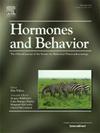人类首次为人父的荷尔蒙变化与父系投资的关系
IF 2.5
3区 医学
Q2 BEHAVIORAL SCIENCES
引用次数: 0
摘要
在许多双亲物种中,雄性在转变为父亲的过程中会经历荷尔蒙的变化,为新的照顾角色做好准备。在人类中,横断面比较揭示了父亲和非父亲之间激素水平的差异,但尚不清楚新父亲的激素水平何时发生变化,这种变化与父亲的参与和依恋有何关系,甚至不清楚具有特定激素特征的男性是否更有可能成为父亲。在这项纵向研究中,我们旨在以比以往研究更大的时间分辨率阐明新父亲激素变化的轨迹,并通过询问激素水平是否预测随后时间点的行为,或反之亦然,进一步了解激素水平与父亲行为之间的因果关系方向。我们招募了51名首次怀孕的父亲,并在妊娠4 - 5个月至产后4个月的四个时间点测量了血浆睾酮、催产素、加压素和皮质醇的水平,并将这些变化与57名成年非父亲男性的对照样本进行了比较。我们还研究了激素水平与父亲自我报告的父亲行为之间的同步和滞后关系。从产前早期开始,与非父亲相比,父亲的睾丸激素和抗利尿激素水平较低,而产前这些激素水平较低,预示着出生后父亲对母亲和孩子的投入更大。与人类母亲的情况类似,新父亲的催产素水平在整个妊娠期都有所上升,但催产素水平与更多的自我报告的父亲参与或依恋无关。最后,皮质醇水平在父亲和非父亲之间没有差异,也不能预测父亲的参与或依恋。我们的研究结果提出了一种可能性,即准爸爸的抗利尿激素和睾丸激素水平较低,预示着他们的生活史策略将转向在育儿方面投入更多。本文章由计算机程序翻译,如有差异,请以英文原文为准。
Hormonal changes in first-time human fathers in relation to paternal investment
In many biparental species, males experience hormonal changes across the transition to fatherhood that prepare them for their new caregiving role. In humans, cross-sectional comparisons have revealed hormonal differences between fathers and nonfathers, however it is not clear when hormone levels change in new fathers, how such changes relate to paternal involvement and attachment, or even whether men with particular hormonal profiles are more likely to become fathers. In this longitudinal study, we aimed to elucidate the trajectory of hormonal changes in new fathers with greater temporal resolution than previous studies, and to provide further insight into the direction of causality between hormone levels and paternal behavior by asking whether hormone levels predict behavior at subsequent time points, or vice-versa. We recruited a sample of 51 first-time expecting fathers and measured levels of plasma testosterone, oxytocin, vasopressin and cortisol at four time points spanning 4–5 months gestation through 4 months postnatally, and we compared these changes to those found in a control sample of 57 adult male nonfathers. We also examined the concurrent and lagged relationships between hormone levels and fathers' self-reported paternal behaviors. From early in the prenatal period, fathers showed lower levels of both testosterone and vasopressin compared with nonfathers, and lower levels of these hormones during the prenatal period predicted greater postnatal paternal investment in the mother and child. Similar to what is known for human mothers, oxytocin levels increased across the gestational period in new fathers, but oxytocin levels were not associated with greater self-reported paternal involvement or attachment. Finally, cortisol levels did not differ between fathers and nonfathers, and were not predictive of paternal involvement or attachment. Our findings raise the possibility that low levels of vasopressin and testosterone found in expecting fathers anticipate a shift in life history strategy toward greater investment in parenting.
求助全文
通过发布文献求助,成功后即可免费获取论文全文。
去求助
来源期刊

Hormones and Behavior
医学-行为科学
CiteScore
6.70
自引率
8.60%
发文量
139
审稿时长
91 days
期刊介绍:
Hormones and Behavior publishes original research articles, reviews and special issues concerning hormone-brain-behavior relationships, broadly defined. The journal''s scope ranges from laboratory and field studies concerning neuroendocrine as well as endocrine mechanisms controlling the development or adult expression of behavior to studies concerning the environmental control and evolutionary significance of hormone-behavior relationships. The journal welcomes studies conducted on species ranging from invertebrates to mammals, including humans.
 求助内容:
求助内容: 应助结果提醒方式:
应助结果提醒方式:


